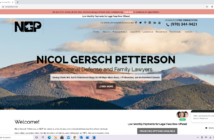1,900 Twitter followers, weekly bulletin with 40,000 subscribers, and the #1 immigration website grew this firm to 9 attorneys in 3 offices.
Gregory Siskind is one of the most prominent immigration lawyers in the nation. Getting there was quite a feat given that his firm, Siskind Susser PC, is based far from the major immigration gateways in Memphis, Tennessee.
Siskind’s trailblazing use of the Internet — to showcase his expertise and place himself in the thick of immigration policy debates — largely accounts for his success.
Siskind says he was the first immigration lawyer in the nation to have a website, which explains why he was able to snap up a prime domain name, VisaLaw.com. A few years later, in 1997, he was the first lawyer in the nation to launch a blog. He has compiled what he has learned over the years in an American Bar Association book, The Lawyer’s Guide to Marketing on the Internet, which has appeared in three editions so far, with a fourth on the way.
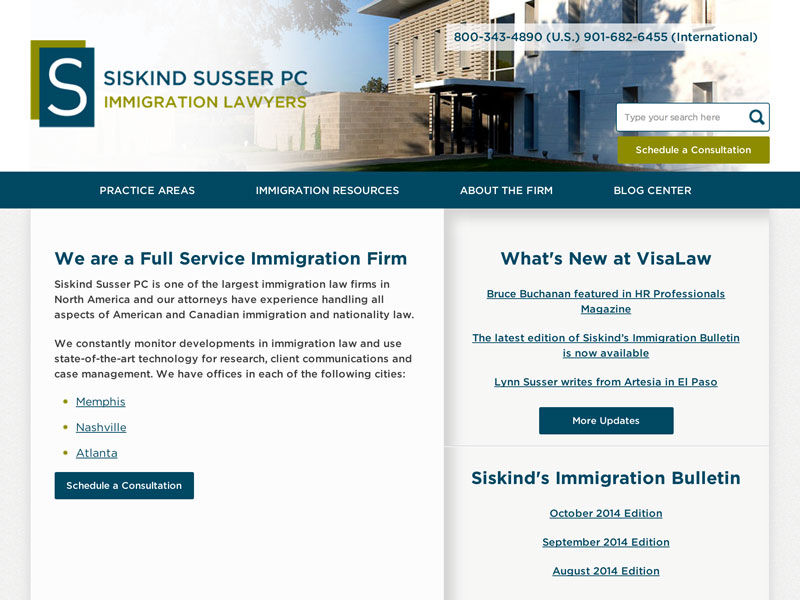
A Techie by Necessity
Siskind insists he “is not a techie in any way.” He was an early adopter of personal computers out of necessity. In his first job after law school in the early 1990s, as an associate at a Nashville law firm sharing a legal assistant with a partner who was “monopolizing all of her time,” Siskind had to get a computer to do his own word processing. A friend hooked him up to a new thing called the Internet, and introduced him to newsgroups. He soon found one about immigration law, a favorite field of his since law school.
“There were all sorts of people posting questions but there were no lawyers in the newsgroup. If I saw an interesting question, I would research the answer. That is how I got onto the Internet, answering questions for folks on that message board. Then some matters started to come in,” Siskind says. Some of the new clients were far from Tennessee, which mystified others at the firm. “They were scratching their heads, wondering how I got a matter from Idaho or from Rhode Island,” he recalls.
When Siskind left the firm to start a solo immigration practice, he knew the Internet was the wave of the future, particularly for immigration lawyers, who deal in federal law and handle most cases administratively with no need to appear in court. “My website went live at basically the same time as my law firm, in June 1994. The rest is history,” says Siskind, whose firm now has nine attorneys and offices in Nashville and Atlanta as well as Memphis.
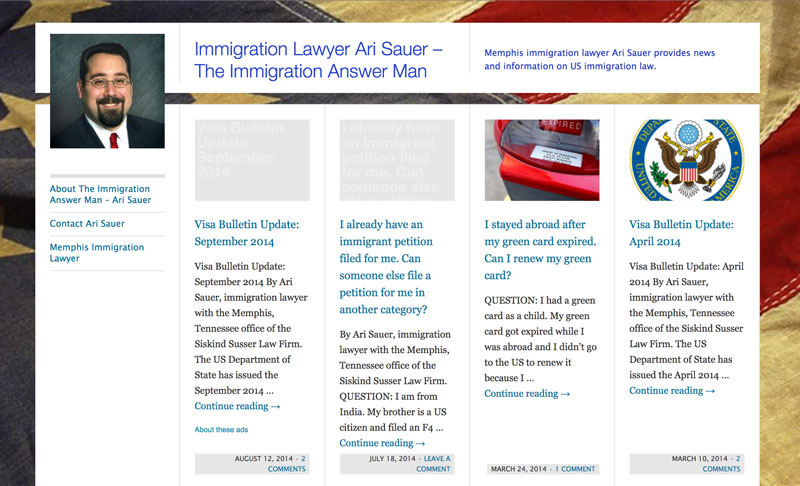
Giving Free Advice Pays Off
These days, Siskind Susser disseminates a free weekly bulletin to around 40,000 subscribers. The firm’s information-packed website features “in-depth portals” on immigration niches for nurses and doctors, investors, athletes, artists and other professionals, with links to relevant statutes, regulations and immigration forms.
The website also carries a popular feature called the “Answer Man,” in which a lawyer with the firm, Ari Sauer, answers questions about U.S. immigration law that come in from around the world. A lengthy disclaimer at the bottom of every exchange states that the firm “cannot assume any liability related to reliance on anything posted here,” and that readers should consult with an immigration lawyer before acting because the law constantly changes and every case is different
Siskind says the firm has never been threatened with a suit by visitors to the site who claim they were misled. “If there is any kind of complaint we have gotten, and that has been very rare, it is that something on the site doesn’t reflect current policy,” he says. Despite the complaints, material is left on the site for archival purposes, even if it is dated. “Sometimes that old stuff is pretty useful,” he says. For example, during natural disasters or the most recent government shutdown, the VisaLaw.com archives “showed how immigration agencies dealt with those kinds of things in the past.”
A dedicated staffer helps maintain the web content, but the firm’s lawyers are also expected to contribute. “I see that as professional development for the lawyers as well as marketing,” Siskind says. “You have to get into the nitty-gritty of what’s on the web while generating a lot of original content.”
It adds up to a lot of work-product that Siskind Susser is giving away free of charge to would-be immigrants … most of whom will never retain the firm. “But that’s okay,” says Siskind. “Enough do become clients that it doesn’t matter.” Besides, the firm has gravitated towards specialized niches, representing artists, athletes, and medical professionals seeking to work in the United States, as well as corporations concerned about compliance with immigration laws. “Those are areas where not too many people are going the do-it-yourself route, and those are the areas we target,” he says.
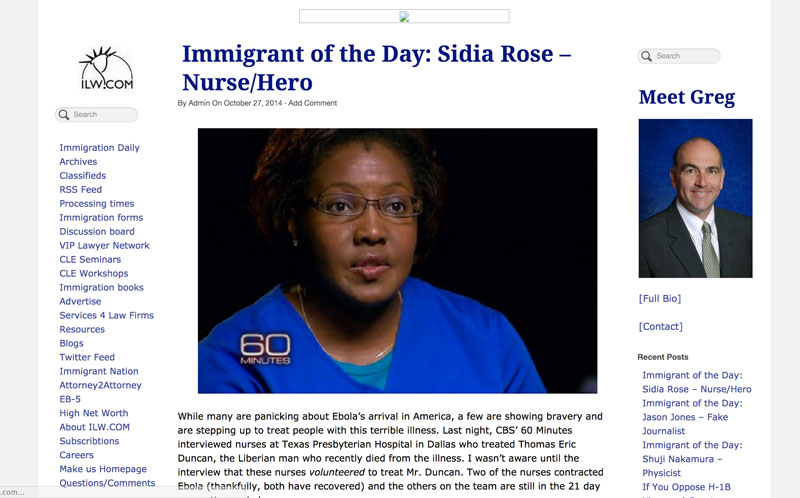
Unpaid Advocacy Work Brings in Business
Publishing information about immigration law isn’t the only way Siskind has moved to the forefront of his field. “The other thing that has really made a difference is how I have used the web and my blog for advocacy on immigration issues,” he says. “That has opened up a lot of doors and given me a lot of credibility. I never billed for any of that, but obviously, if my work is changing the legal environment to be more friendly to businesses, especially for skilled employment immigration, that benefits my practice.”
For example, quota numbers governing certain categories of immigrants have not been adjusted in 25 years. “To the extent that my advocacy is helping make it possible for employers to actually get workers they need, then there is legal work to be had. Plus, you have generated a whole lot of good will with employers.”
Siskind has also done a lot of behind-the-scenes drafting work on immigration laws. For instance, a physician-immigration bill he helped draft was part of an omnibus bill that passed the Senate, and has also been introduced as a stand-alone bill. “That is obviously good for the public because there is a physician shortage around the country,” says Siskind, whose firm represents a number of hospital companies. “It would also be really great for our clients and really great for our firm if it passed,” he says.
On another occasion, he helped write the rules for a federal agency that has a physician visa program. “It is great marketing to be able to say to a prospective client who is going to be dealing with that agency that I know the agency inside and out because I wrote their rules,” Siskind says.
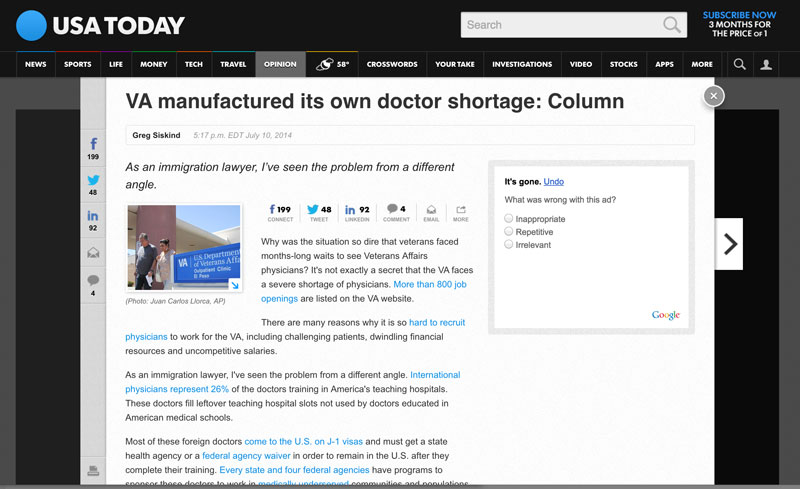
Op-Ed Pieces ‘Are Great’
Newspaper opinion pieces have proven to be highly effective ways to showcase his expertise to the general public, says Siskind, who tries to publish several a year. “Op-eds are great because basically the newspaper is saying you are an expert, and there is nothing better than that,” he explains.
His most recent op-ed piece was for USA Today on the issue of physician immigration and how it relates to the Veteran’s Administration scandal. It ran in the print edition and on the paper’s website, and was shared on Facebook by more than 200 people and by 60 Twitter uses.
Siskind Susser may not get any business that can be directly attributed to the article. “But it is like branding in general “You have to focus on multiple channels to develop a brand,” Siskind says, who apparently has become one. “A lot of times, when people come to me, I will say, how did you hear about us? And they will say, I don’t know, people just know about you.”
Pick Your Strength on the Internet
Many of the new online communications tools can help market a law practice, Siskind says. But he advises against using too many of them. “I am a believer in picking a couple of things and doing them well instead of doing a little bit on everything, and having a minimal impact on each. When law firms take that approach, it is not really surprising when they say nothing is working,” he says. “So pick the things that you like to do.
“If you really enjoy writing in a longer form, then probably your website and newsletters are the place to do that. If writing is not your thing, then Twitter is great, because basically you do 140 characters and are done. You don’t necessarily have to be a super-talented writer to be effective on Facebook, either.” The proliferation of options is bewildering, he says. “But now, you can pick your strength and find the tools that really allow you to excel.”
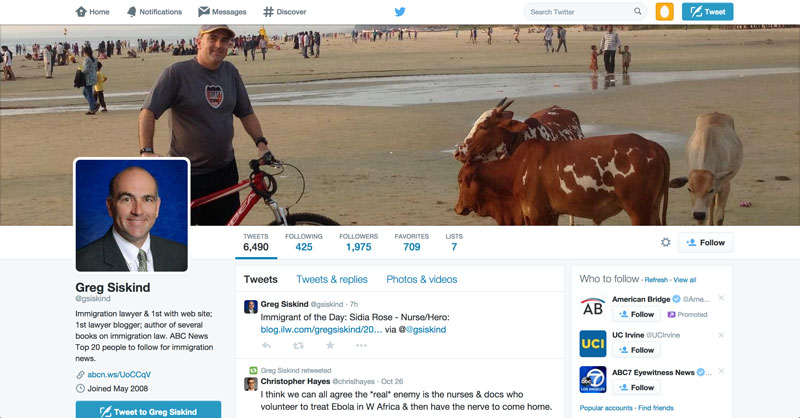
A Convert to Twitter
Siskind has found that one of the best tools for him is Twitter. That came as a surprise to a former “Twitter skeptic.” At first, he used it only to announce that he had posted something new on his blog. That changed several years ago when the ABC News web site named him as one of the 20 best people to follow on Twitter to keep up on the immigration debate.
“Within a week, I had four or five hundred new followers,” says Siskind, who realized that he would have to start paying more attention to what he was tweeting. He now has nearly 1,900 followers, and exclaims, “Twitter is great.”
More than 100 of his follower are reporters. “When a reporter follows me, I will generally follow them back, because they usually cover immigration, and it is helpful to see what they are writing,” Siskind says. He also regularly responds to their tweets, which is “a really helpful way to develop relationships with particular reporters.” When they need a quote from an immigration lawyer for a story they are writing, they will often call him, he says.
How often does he tweet? “All day,” he says, only half in jest. “Well, not literally all day, but whenever I have a few minutes to spare, I will go on Twitter and see what others are saying,” he says. “There are probably 10 or 15 things a day that I either write or maybe re-tweet.” On one recent day, he engaged in a four-way Twitter debate with a congressional aide, a think tank expert and another immigration lawyer. “The collective audience of all of us was probably 10,000,” he says.
He can’t attribute any new business to his tweets. But he has gotten lots of calls, for example from hospitals, that have repeatedly seen him in the middle of immigration policy debates, and Twitter has helped keep him there, he says.
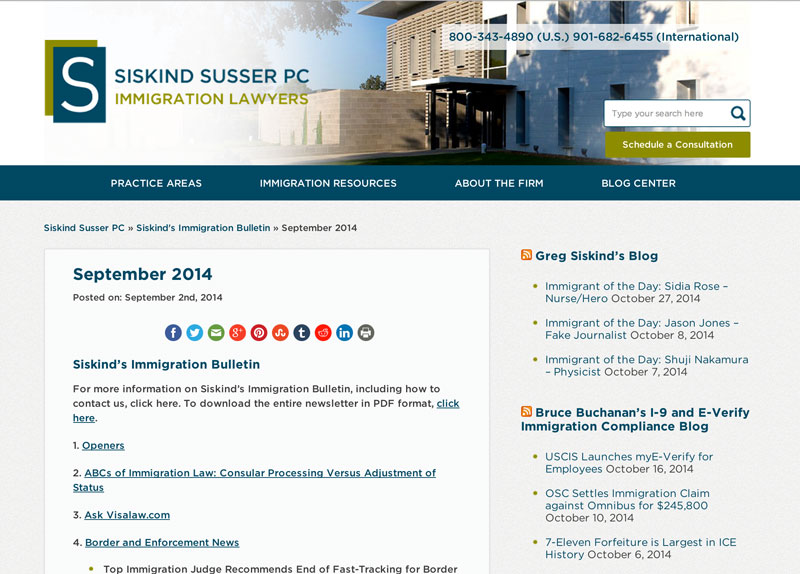
Some Traditional Methods Still Work
Though Siskind is a big fan of Internet publishing and marketing tools, he insists that some old-fashioned methods of marketing are as useful as ever. Printed books, for one, “are still really key,” he says. “If you can literally say you wrote the book on a particular subject, you will always have an edge.”
Siskind has produced a book with a new edition every year on physician immigration. “When we are pitching a new client, such as a hospital system, I always send them a copy of the book, which is the size of the Yellow Pages. That really makes an impression,” he says. Likewise, public speaking “is still one of the most effective things you can do, if you’re good at it.”
Siskind adds that lawyers should leverage those efforts with some of the newer online tools. “If you’re giving a talk, you should tweet about it beforehand. And then, if it was recorded, you might be able to put the recording up on your website. Or if people tweeted from the event, you can retweet some of those later. That way you can deliver your talk to far more people than actually attended,” he says.
“It is all related,” Siskind adds. “It is a collection of efforts over a period of time that makes the difference.”


